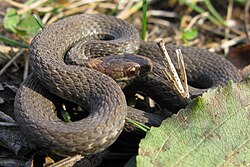Snakes
| Scientific name | Common name(s) | Image | Notes |
|---|---|---|---|
| Coluber constrictor constrictor [1] | Northern black racer [1] |  | |
| Agkistrodon contortrix mokasen [1] | Northern copperhead [1] |  | Venomous [1] |
| Storeria dekayi dekayi [1] | Northern brown snake / Dekay's brown snake [1] |  | |
| Pantherophis alleghaniensis [1] | Gray rat snake [1] |  | |
| Thamnophis sirtalis sirtalis [1] | Eastern Garter Snake [1] |  | |
| Heterodon platirhinos [1] | Eastern hognose Snake [1] |  | |
| Lampropeltis triangulum triangulum [1] | Eastern milksnake [1] |  | |
| Nerodia sipedon sipedon [1] | Northern water snake [1] |  | |
| Storeria occipitomaculata occipitomaculata [1] | Northern redbelly Snake [1] |  | |
| Thamnophis saurita saurita [1] | Eastern ribbonsnake [1] |  | |
| Diadophis punctatus edwardsii [1] | Northern ringneck Snake [1] |  | |
| Opheodrys vernalis [1] | Smooth green snake [1] |  | |
| Crotalus horridus [1] | Timber rattlesnake / canebrake rattlesnake [1] |  | Venomous [1] |
| Carphophis amoenus amoenus [1] | Eastern worm snake [1] |  |